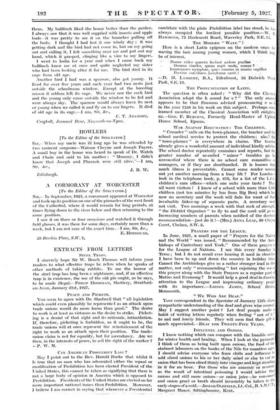EXTRACTS FROM LETTERS
STEEL TRAPS.
I sincerely hope Sir NV. Beach Thomas will inform your readers to what effective traps he refers when he speaks of other methods of taking rabbits. To me the horror of the steel trap has long been r. nightmare, and, if an effective trap is in existence, the use of the old gin ought, as he says, to be made illegal.—Pmere HoorcuAm, Shottery, Stratford- on-Avon, January 31st, 1927.
PEACE AND PICKETS.
You seem to agree with Dr. Shadwell that "all legislation which could even plausibly be represented as an attack upon trade unions would do more harm than good." The desire to work is at least as virtuous as the desire to strike. Picket- ing is a denial of that right and its rationale, intimidation. If, therefore, picketing is forbidden, as it ought to be, the trade unions will at once represent the reinstatement of the right to work as an attack upon their position. The trade- union claim is not for equality, but for ascendancy. Are we then, in the interests of peace, to sell the right of the worker ? —P. W. M. - CAN AMERICAN PROSPERITY LAST?
May I point out to the Rev. Harold Bueke that whilst it is true that no man who has advocated either the- repeal. or modification of Prohibition has- been elected President Of the- United States, this cannot be taken as signifying that there is not a large body of opinion in America which is opposed to Prohibition. Presidents of the United States are elected on far more important national issues than Prohibition. Moreover,
believe I am correct in saying that whenever a Presidential candidate with the plain Prohibition label has stood, he has always occupied the lowliest possible position.—W. IIAmmoND, • 73 Harlescott Road, Waverley Park,* S.E. 15.
THE MODERN " WAVE " !
'Here is a short Latin epigram on the modern -craze for waving the hair among young women, which- I "think may be of interest.
-. • Nonne vides quanto faciant ardore puellare:
Oceania similes, quem regit unda, comas t- - Immemores nymphae, qua 3 summo in monte capillos Pectine concilians Loreleana canit . . , . .
—D. H. LAMBERT, BA., -Edenhurst, 10 Dulwich Weed Park, S.E. 19.
Tim PRONUNCIATION OF LATIN.
The question is often asked-: "Why did the Classical Association adopt the k sound for 'c ? " The only answer appears to be that Erasmus advised pronouncing c as in the year 1528 in his work on this subject. Perhaps smite learned member of the Classical Association will enlighten us.—GEo. F. BURGESS, Formerly Head-Master of Upland House School, Epsom. -
WAR AGAINST RHEUMATICS: THE CHILDREN.
"Crusader "calls on the town-planner, the teacher and the school medical service to protect the children; alas! the " town-planner " is everywhere in chains. The teacher already gives a wonderful amount of individual kindly advice. The school doctor repeatedly examines and reports, but the greater number of so-called " minor " troubles go by unremedied where there is no school care. committee or managers, or if they are shorthanded. It is known that much illness is preventable. Cannot some reader wrench out yet another morning from a busy life ? For London- look in the telephone book, p. 676, for a list of the L.C.C. children's care offices—which one suits your taste ? They all want visitors I know of a school with more than 1,1nO children (not ten minutes by bus from Big Ben) which has now no secretary and the work will fade for want of that invaluable linker-up of separate parts. A secretary need not visit. Two mornings a week with that rock of strength, "the District Organizer" to fly to and the work will go on. Increasing numbers of parents when notified of the doctors recommendation—just do it !—(Mrs.) ANTIct LEAF, 80 Cheyne Court, Chelsea, S.W. 3.
PRAYERS FOR THE LEAGUE.
In June, 1921, a* small paper of "Prayers for the Nation and the 'World" was issued, "Recommended by the Arch- bishops of Canterbury and York." One of these prayers is for the League of Nations. I use this every Sunday in Term ; but I do not recall ever hearing it used in chandler I have been to up and down the country in holiday tins. Cannot the Archbishops give us a rather stronger lead in this matter, not only " recommending " but enjoining the use of this prayer along with the State Prayers as a regular part of Matins and Evensong ? It would help a good deal in drawing attention to the League and impressing ordinary people with its importance.—LION'EL JAMES, School House, Monmouth.
"WE WHO 'ARE DEAF."
Your correspondent in the 'Spectator of January 15th shoo sympathetic understanding of the deaf and gives wise counsel. May I suggest another point ? Let deaf people make a habit of writing letters regularly when feeling "out of to sad and lonely friends. They will soon find their gift ii much appreciated.—DEAF FOR TWENTY-FIVE YEARS.
INFLUENZA .AND ONIONS.
I know nothing which can compare with the humble oniorl for winter health and healing. When I look at the pyranlid5 I think of themi as being built upon onions, the food of the stalwart labourers on the banks .of the Nile for countless ages I should advise everyone who fears chills' and influenza to add sliced onions to his -or her daily salad or else to eat an onion that has been sliced thinly into vinegar and kept standing 'in it for' an hour.' For those 'who are anaemic' Or neur°1ic as the result of intestinal' poisoning I would advise that onions and still more onions—or. onion juice—be consumed and onion gruel or broth should. invariably be taken in the early stages of a cOld.--AoseAtOrmitEen,,Lt.-Col..,.R.A.M.C.T., Margaret Manor, Sittingbourne, Kent. ,


























































 Previous page
Previous page